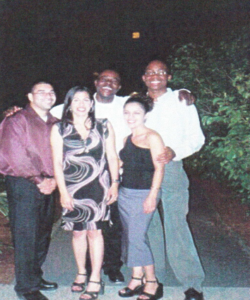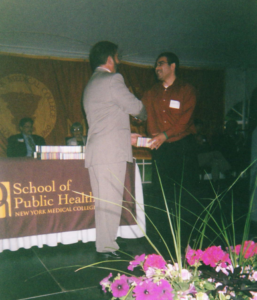Public Health Analyst Series: Hector’s Journey

A night out with my internship colleagues.
In the summer of 2001, I had one of those life-defining moments while interning at Harvard Medical School; I discovered the public health field. Up to that point, all I ever wanted to be was a family medicine physician with a dream of one day opening a private practice to help those in my community back in Peekskill, New York.
The summer internship exposed me to the different public health disciplines and paired me with a mentor to work on a project. I worked with Dr. Joseph Betancourt who introduced me to the concept of health disparities which are the inequalities that occur in the provision of healthcare and access to healthcare across different racial, ethnic, and socioeconomic groups. I was surprised by these inequalities as up until then I had assumed all patients received the same level of care regardless of race, ethnicity, and sociodemographic factors. The more I learned about health disparities, the more I wanted to find a way to make a difference. By the end of the summer, I realized that part of the problem is the lack of teaching cultural competency in the medical school curriculum. Cultural competency involves knowledge-based skills required to provide effective clinical care to patients from different ethnic or racial groups. For example, people of color and low-income individuals are more likely to be uninsured, face barriers to accessing care, and have higher rates of certain conditions compared to Whites and those at higher incomes.

My college graduation.
During my senior year in college, I questioned if being a family medicine physician was the best way to help my community and address health disparities. My experiences while interning at Harvard Medical School helped me realize that policy can have a bigger impact on a community and the practice of medicine, so I decided to pursue a Master of Public Health degree with a concentration in health policy and management.

School of Public Health awards night.
At Lantana Consulting Group, I have the opportunity to have a positive impact on communities and medical practice every day. I apply my knowledge and experience to my work with the Centers for Medicare & Medicaid Services (CMS) on hospital and physician office quality reporting programs. The work I do now is fulfilling; I assist CMS with the administration of legislatively-mandated programs and provide recommendations which help set the trend for the industry that impacts the quality of care across our nation by accounting for social determinants of health (SDOH) in quality reporting, quality improvement, and measure development to address health disparities.